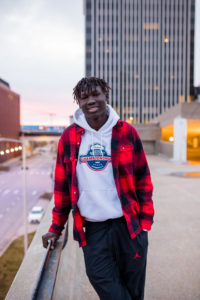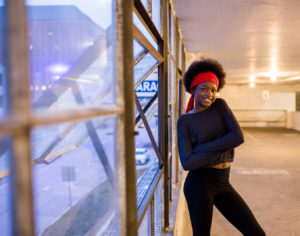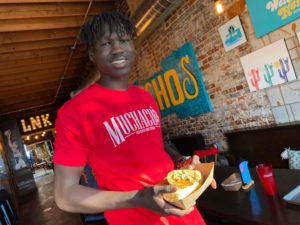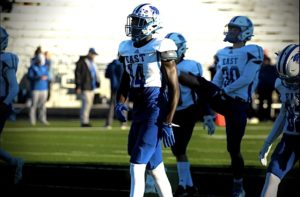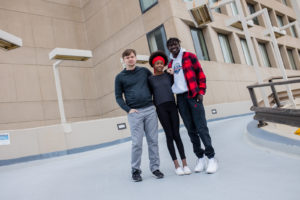The Power of Love: Siblings Thrive After Traumatic Early Childhood
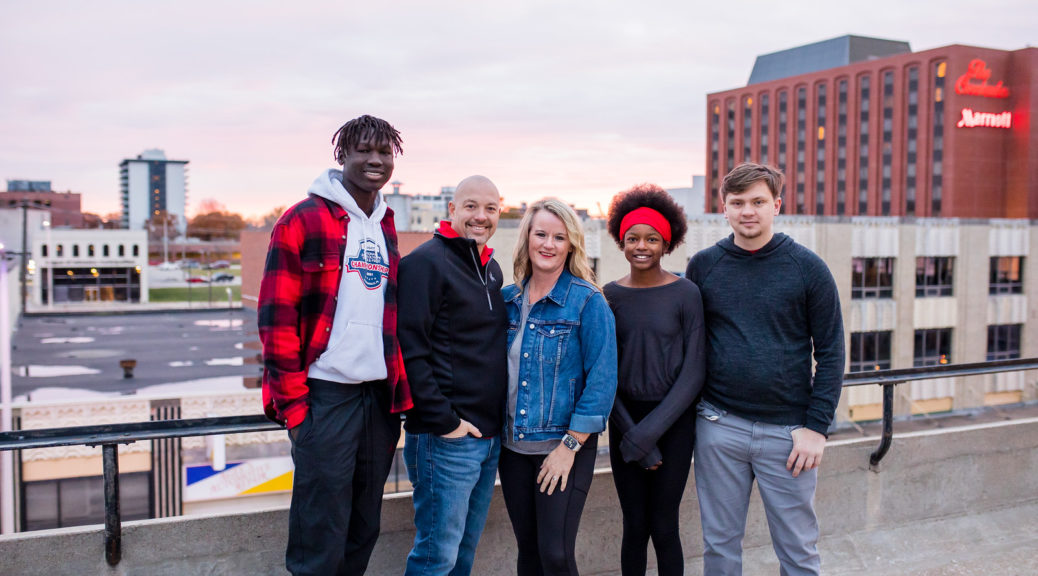
“Thank you for the love,” said Malachi Coleman in a tweet. As a young man who was once in foster care and is now a high school football phenom with 19 college offers and counting, Malachi humbly shares messages of gratitude like this with his thousands of Twitter followers (@ChiColeman23).
Every person deserves to feel loved and valued. That’s what Craig and Miranda Coleman have worked so hard to instill in their children Ean, Malachi and Nevaeh.
By the time siblings Malachi and Nevaeh met the Colemans, they had endured more than their fair share of heartbreak. Malachi’s father died when he was young, and Nevaeh’s father’s whereabouts were unknown. Their mother dropped them off at a stranger’s house when the kids were 5 and 2 and never returned.
“She said she’d be back,” Malachi said. “I haven’t seen her since that day.”
Though Malachi doesn’t recall much about that time, he remembers stepping into a caretaker role so he and his sister could survive. When Malachi and Nevaeh entered foster care, KVC Nebraska supported them in three foster homes before the child placing team – and a stroke of fate – brought the siblings and the Colemans together.
Become a foster parent and be a beacon of hope for youth in foster care. Sign up for more foster parenting information.
A Divine Push
Craig and Miranda Coleman found their inspiration to become foster parents from hearing a message at church. They intended to foster one child at a time, but at the end of their licensing class, KVC asked them to consider adopting two siblings who were at risk of being separated. After a couple weeks, the Colemans said yes, knowing KVC would support them every step of the way.
“We decided to help children in foster care because God was pretty actively shoving us,” said Miranda. “God was leading us down that path, and we tried to not shut down what God was putting in front of us.”
After the Colemans said yes, Malachi and Nevaeh spent every weekend with the Colemans from October 2014 to January 2015. Then the siblings moved in January 2015 and never left. Malachi and Nevaeh are the first and only kids the Colemans cared for in foster care.
“If we didn’t adopt, they were going to be separated,” said Miranda. “That piece alone, especially once you meet these two and see their relationship, you knew that could not happen. It would have devastated them.”
Love, Trust, and Progress
Malachi and Nevaeh’s early childhood taught them to fend for themselves and rely on no one else but each other. At ages 9 (Malachi) and almost 6 (Nevaeh), they didn’t fully believe that they were deserving of receiving and giving love. The Colemans’ church, pastor and a Bible study that focused on attachment parenting added to their KVC training, giving them the skills to address trauma.
“Trauma is unforgiving,” said Miranda. “When the kids first came to us, I sat them down because I could see that neither one of them really believed they had value to others. I was like, ‘How can you bless someone tomorrow?’ Malachi probably fought me for an hour. Finally, I just looked at him and I’m like, ‘Can you hold one door for one person tomorrow? Just one?’ And he looked at me and was like, ‘Yeah, I can do that.’ There hasn’t been a door that kid doesn’t hold for somebody to this day. He will hold doors for anybody.”
Craig and Miranda’s unwavering support and love helped grow the siblings’ confidence and self-esteem. On Nov. 20, 2015, Malachi and Nevaeh officially joined the Coleman family forever.
“They did the hard work in learning to trust us and taking a leap of faith,” said Miranda. “Without that, we wouldn’t be where we are today.”
Helping Youth Just Like Them
Exceptionally talented in football, basketball and track, Malachi is using his voice to help other kids in foster care see their worth and potential. With Nebraska’s first high school football Name Image Likeness (NIL) deal, Malachi is raising money and giving it all back. Through his fundraising and advocacy, Malachi hopes to make foster care better for the next generation of kids.
Malachi has created a successful brand, Fly Like Chi, and releases Chi-branded merchandise for his nationwide supporters to purchase. Partnering with local Lincoln, Nebraska restaurant, Muchachos, Malachi also created his own burrito special called, “The Giver.” He hosts youth sports camps for aspiring athletes, too. He donates all proceeds from his brand’s merchandise sales, his collaboration with Muchachos, and other NIL deals to KVC Nebraska and the Foster Care Closet of Nebraska.
“Without KVC, I wouldn’t be where I am today,” said Malachi. “When I learned that I could do NIL in high school, I knew I wanted to be impactful. I knew giving back to people who got me to where I am today would be important to me.”
When asked if they had any advice for youth currently in foster care, Malachi and Nevaeh encourage kids not to give up, even though the process can be long. They hope youth try to understand that there are so many people working to find the perfect home for them, whether that’s a safe reunification with their biological caregivers or finding an adoptive family.
Advocating for Vulnerable Children
While his and Nevaeh’s stories have a happy resolution, statistics show that more than 15,000 youth in foster care across America age out each year without finding a permanent family or home.
“Every once in a while, you’ll hear a story of how everything’s amazing and it worked out perfectly, but those stories are very slim,” Malachi said. “A lot of these kids don’t get chances because the opportunities are not there for them. I want kids to have as many opportunities as they can so I’m doing everything I can to make sure that happens.”
Craig, Malachi, and Miranda are planning to sit on KVC’s foster care panel for the TIPS-MAPP class–the same licensing class Craig and Miranda took to become foster parents. Malachi will join the KVC Advisory Board as a youth voice, too.
Bouncing Back and Playing Ball
Their life experiences before and during foster care made Malachi and Nevaeh more resilient. They also shaped who and where they are today.
“Sometimes the tough things are the things you gotta bounce back from and you just gotta keep going forward,” said Nevaeh Coleman.
Currently in eighth grade, Nevaeh shares her brother’s passion for sports. As she gets older and starts high school, she sees herself having fun and competing in softball and track.
As Malachi finishes his junior year, his sights are set on senior year and then college. With over 19 Division I offers to play football, Malachi has more choices for his future than he ever thought possible. He will announce where he will play college football this December. But most importantly, he knows he will continue to make connections in his community to increase his positive impact on youth in foster care. After his football career is over, Malachi’s goal is to pursue a career in affective cognitive therapy, a behavioral health approach that focuses on feeling, verbalizing, and regulating emotions.
With the love their mom and dad have given, Nevaeh says she has the opportunity and confidence to follow her dreams. Malachi says he looks at himself differently now.
“I see myself as wanted,” said Malachi. “I have an amazing support system. Without my family especially, I would never be who I am today. I just thank them every day for that.”
Prevent More Heartbreak, Keep Siblings Together
For many youth experiencing foster care, their siblings are the only constant presence in their lives. A brother or sister may be the only person who understands and shares their experiences. They can help each other make sense of all the changes. Siblings placed together in the same foster home often feel more connected and secure, too.
When siblings are separated from one another, research from the National Center for Youth Law indicates many youth feel “they have lost a part of themselves.” The grief and complex emotions that stem from losing connection with a sibling can compound the anxiety and pain they feel over separation from their parents.
More than 50% of all youth in foster care have one or more siblings. Keeping siblings together can prevent a lifetime of longing and searching for lost brothers and sisters.
“The impact you have on lives, even if it’s just temporary, can be life-changing,” said Craig Coleman.
It only takes ONE caring adult to change a child’s or sibling group’s life forever. Click here to learn how foster parenting can bring joy and meaning to your life, too.

